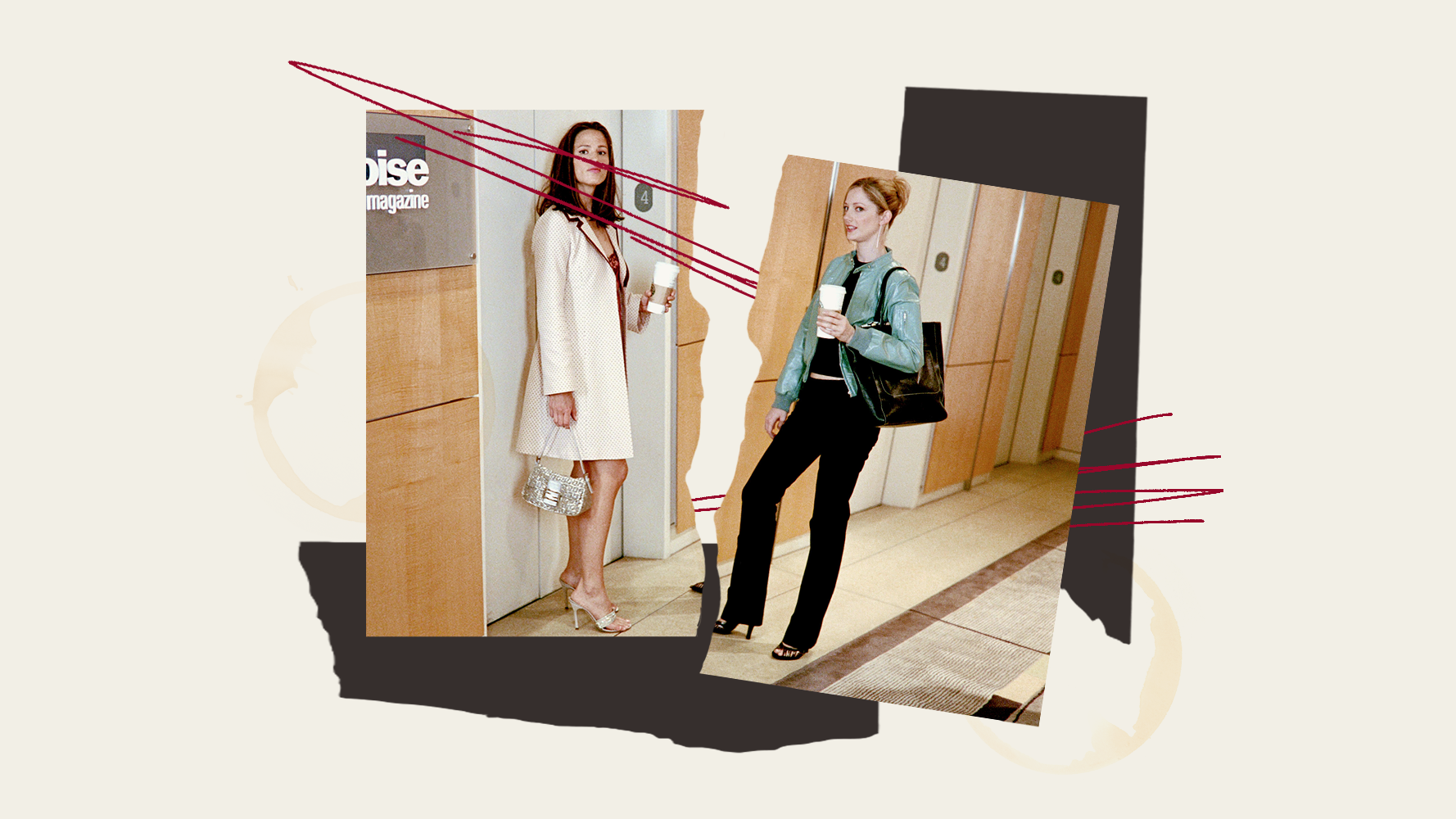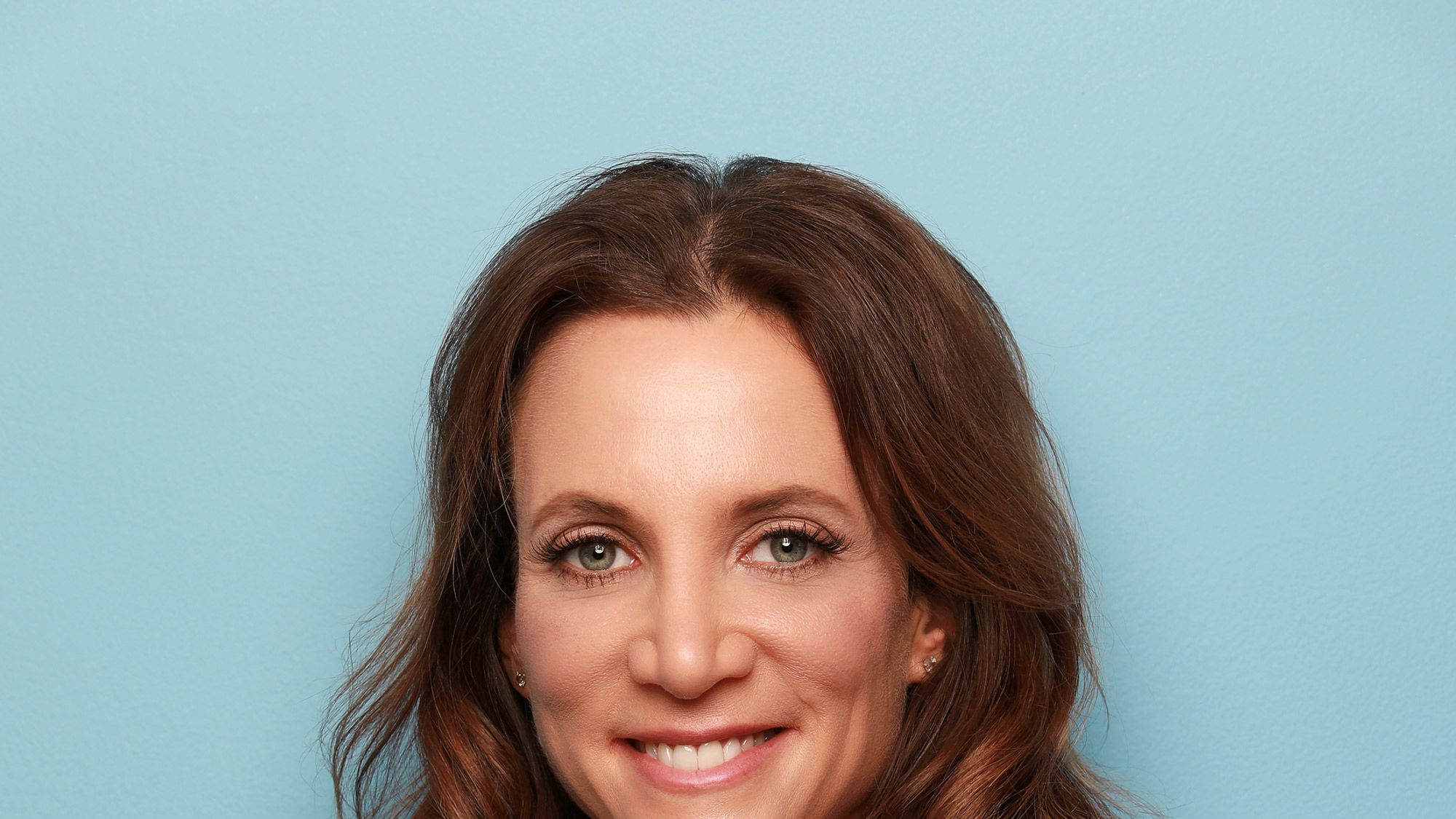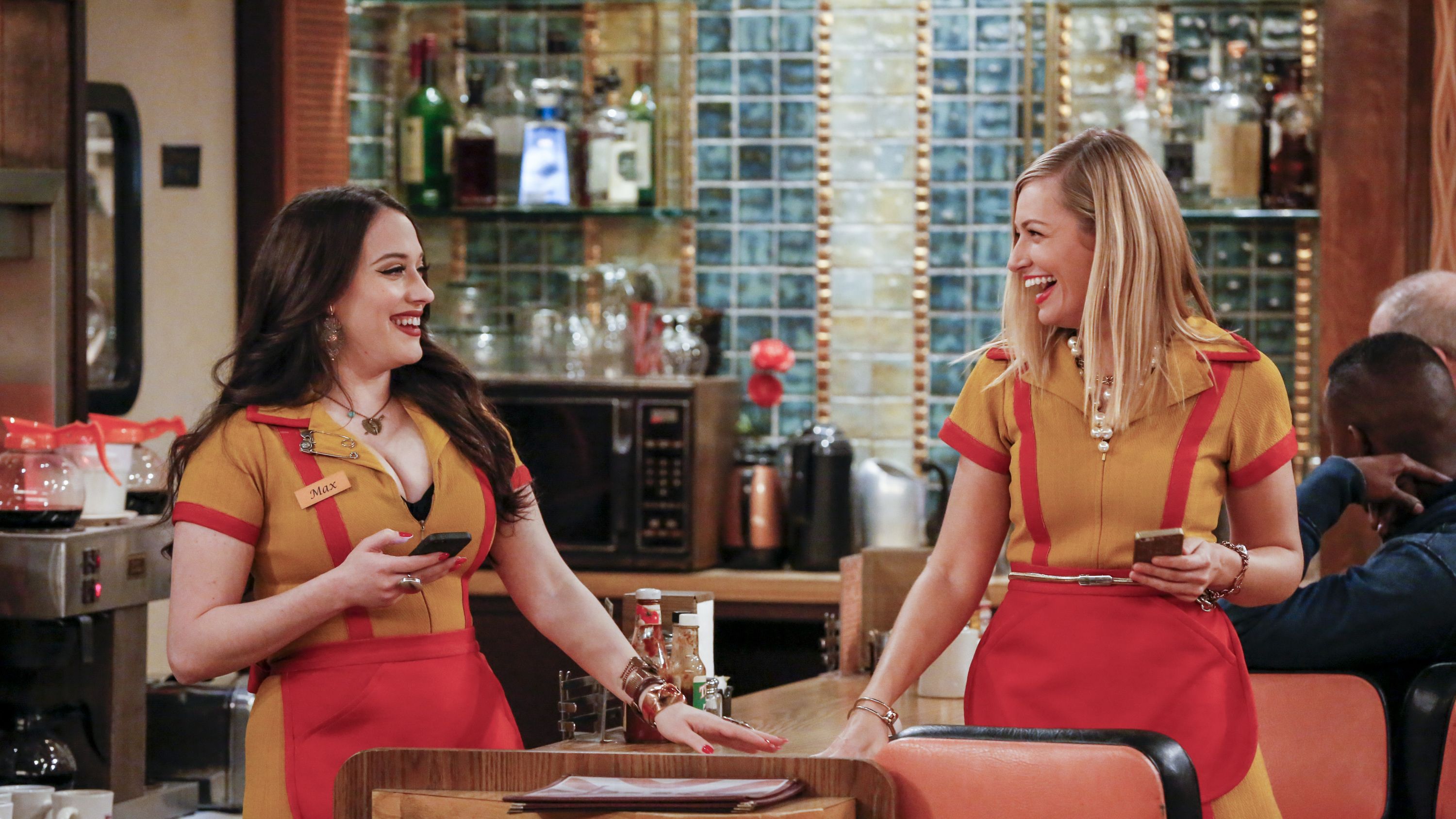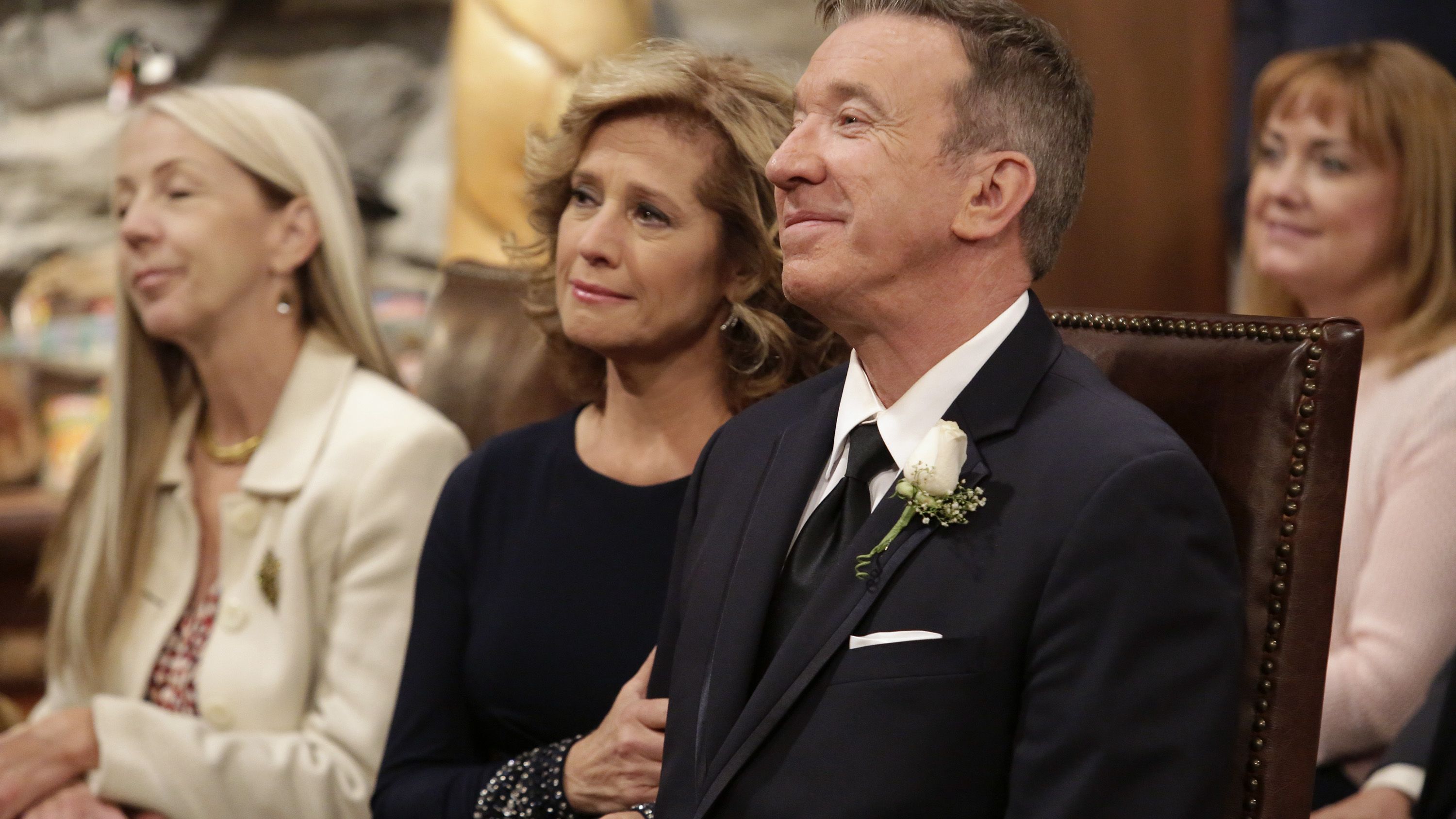How I Found (And Split From) My Work Wife
Sitcom writer and producer Liz Astrof, whose credits include 2 Broke Girls and Last Man Standing, started her career with a partner. Then it all imploded. In an excerpt from her memoir, Don’t Wait Up, she shares her truth: Work wives aren’t for everyone.

My first marriage was a work marriage. Samantha and I met in a sitcom-writing class at the New School in Manhattan in 1996. I gravitated toward Samantha right away because she had features similar to my childhood best friend Rachel’s: thick brown hair cut in a short bob, green eyes, and the overall appearance of a college futon—sort of generally soft and messy but comfortable. After class, we would walk to the subway together, decompressing and debating whether our teacher had really written for the greatest sitcoms of all time, as he had claimed. This was long before Google, so we decided he was definitely lying. No one had a résumé like the one he boasted.
The last night of class, Samantha and I said our goodbyes and good lucks and went our separate ways at the top of the subway steps. Halfway down the stairs, just as the 4 train was pulling into the station and I was about to make a run for it, Samantha called out, “Elizabeth—would you want to be writing partners?!”

Liz Astrof
When I’d first decided to embark on a career in TV writing, my brother, Jeff, suggested I get a writing partner. It would help me get a job on a show, he said. Jeff had a partner, and it worked for him. At the time, they were writing for this new show called Friends, which seemed like it might stay on the air for a couple of seasons. I figured that if Jeff needed a writing partner, then I certainly did too.
So I said, “Sure, why not?!”
Ten months later, with a sample Frasier script that we’d written together, we set out for Los Angeles in search of representation. I let go of my studio apartment—a fifth-floor walk-up with a clanking heater and half-painted walls—and Josh, a guy I was kind of seeing. (The word boyfriend made him uncomfortable, but getting blackout drunk and vomiting off the side of the Staten Island Ferry didn’t.) Samantha, on the other hand, was leaving her longtime girlfriend, Judy, their poodle, Dante, and the two-bedroom condo they owned in Westchester. Judy, the plan went, would come out with the dog as soon as Samantha got settled in L.A.
Judy didn’t like me. It was pretty clear that, thanks to me, and aided by the connections we’d have in my brother, they would both have to uproot their lives. Judy would have to leave her job, as well as the synagogue where she’d advanced to the front row of the choir and all of their friends, including their groomer, with whom they’d become close during Dante’s bout with dog psoriasis.
Our first night in L.A., Samantha and I lay awake in the bed we were sharing at my brother’s place. Shoulder to shoulder in silence, we stared at the ceiling—neither of us able to sleep, each clutching the security blankets we’d brought from home. (Hers was a torn piece of a T-shirt, mine a pillowcase.) We were filled with fear and dread and what I imagine people are filled with after they kill someone in the heat of the moment or decide to move cross country to pursue an almost impossible career with a person they really don’t know all that well, who, as a grown woman, still carries a security blanket.
Get exclusive access to fashion and beauty trends, hot-off-the-press celebrity news, and more.
From that point on, we were a team. We were promised many, many offers from shows and a long and prosperous future in TV.
We rented a car and bought a gigantic cheap cell phone to share. (They were still new at the time.) Almost immediately, the thing was blowing up with calls from talent agencies wanting to meet us, either because they needed to sign the brain trust behind the Frasier sample in which the highfalutin Frasier found out he was good at the blue-collar sport of bowling or because word was out that Jeff and his partner were looking for new representation and they wanted to get in good with him.
I was guessing the latter. But a break is a break, and we quickly signed with the agency that brought out the biggest fruit platter. This made our work marriage official. From that point on, we were a team. We were promised many, many offers from shows and a long and prosperous future in TV.
Staffing season (the time when shows hire their writers) began, and our agents sent us on meetings with studio and network execs, who serve as gatekeepers for the actual shows. Even the most stable couple would buckle under the stress of navigating L.A.’s horrific traffic. With a giant map spread across the dashboard (it was pre-GPS times) and not so much as a fraction of a sense of direction between us, we were constantly late and arguing more and more. We’d gotten along great in New York, but, like an omelet or french fries, our relationship didn’t travel well. It was safe to say the honeymoon was over almost as soon as it began.
Despite all the meetings, we didn’t wind up with a job. I was devastated, desperate, and angry. I wondered if the reason we weren’t getting staffed was Samantha’s shrill voice, which I’d only just started to notice. Or was it the way she cracked her knuckles on her thighs in meetings—both hands at once crunching, then the thumbs—all right in the middle of someone (usually me) talking? Or maybe it was the way her exhales sounded like a city bus coming to a slow, labored stop? Or the matronly dresses she wore? I had one very hip accessory—a Kate Spade backpack. It had been a gift from a friend in New York who worked in the showroom. I always made sure it was visible in meetings, as if to say, “She might look like a middle-aged preschool teacher, but I’m cool. I can compensate, trust me. Trust us.”

A scene from 2 Broke Girls, which Astrof was an executive producer on after splitting with her work wife.
We had to wait another 10 months for the next TV staffing season. So with our Frasier sample, we applied to the esteemed Warner Bros. Television Writers’ Workshop, which was nearly impossible to get into. But if we got in, it was basically guaranteed to help us get a job the following season.
Meanwhile, Samantha found a grown-up apartment for herself, Judy, and their dog. I found a studio apartment much like the one I’d had in New York. Samantha and I continued to work, this time on a Dharma & Greg sample. Judy continued to hate me. To make my rent, I had four day jobs—including delivering summer-camp flyers to public schools all over Los Angeles.
Around that time, our agency called. Please be a job offer, I prayed. A meeting, a fruit platter, anything! It wasn’t a fruit platter. Our agents, it turned out, were dropping us. Jeff and his partner had signed with another agency, and our agency had decided that we weren’t a “good fit” anymore.
I finally faced facts: What the fuck was I doing in L.A.? Did I even want to be a writer? Now we didn’t even have an agent. I missed New York: the seasons, the average-looking people. I even missed Josh. I wanted to go home. I wanted to quit.
A month or so went by, and after a long day of dog walking and telemarketing, my giant cell phone rang with good news: Samantha and I had been accepted into the Warner Bros. Television Writers’ Workshop. Again, I figured it was probably my brother working on a Warner Bros. show and not the brilliance of our Frasier script that got us in. But also again, I wasn’t going to complain. This business was proving to be as brutal as I’d feared, and when one nepotism door closes, another opens.
I was also intimidated. I knew I could never have done this alone, so I was happy to have Samantha next to me.
The first night of class, we walked into a huge conference room with a giant square light-oak table at the center and were told it was where the casts of Warner Bros. shows like Friends and Everybody Loves Raymond read aloud their scripts for the coming week of production. I was on hallowed ground and completely awestruck. I was also intimidated. I knew I could never have done this alone, so I was happy to have Samantha next to me, a second security blanket. Samantha and I had made it to this point. We had survived our growing pains and even a few knock-down, drag-out fights.
Before class started, one of the students casually reached for a bottle of water that was sitting on a credenza off to the side.
“Water is for writers!” boomed a male voice. We all jumped, turned, and saw David Sacks, the Warner Bros. executive who ran the program, standing in the doorway. He meant that water was for the actual working writers who would be coming to speak to us nobodies. Everyone stared wide-eyed, glad that they hadn’t made the same mistake of being thirsty.
Once David had made it clear that we were nothing here, he told us that out of the 28 people in the program, only about three would go on to have successful writing careers. This was very Marines-like and a far cry from what our writing teacher had predicted for us back at the New School. Shame on him for lying about our chances as well as his credits.
The program was a six-week course in which we’d write a sample script for a Warner Bros. show. Samantha and I decided to write an Everybody Loves Raymond episode. We had written our Frasier sample script at our leisure over the course of a year. Now we had a deadline—and I had four jobs.
We worked constantly. I called in sick to my other jobs; Samantha stood up to Judy when she wanted to go furniture shopping or “have a life.” In record time, we came away with a script we were proud of. I was excited. Confident even.

Astrof was a writer and executive producer on Last Man Standing.
David Sacks hated it. Haaaated it. The story didn’t work. The jokes weren’t right. The characters had no “drive.” “Raymond would never say that” was scrawled across every page. We still had a chance to salvage it—the second draft. But we needed to rethink the whole thing. Worse, we had only a weekend to do it. We left the writers’ building that Thursday night completely rattled, too embarrassed to even look at each other.
I was the first one to talk. “We can work at my place this weekend,” I said. “I’ll get candy and stuff.”
“I can’t. I’m going to New Mexico with Judy,” Samantha told me, almost defiantly. “It’s not necessary to work this hard.”
I stopped in my tracks and turned to her. “Are you fucking kidding me?” I shouted. “We have to rewrite a whole script in two days! You cannot go on vacation! This is what we moved here for!” I lowered my voice and continued, quietly but firmly: “Tell Judy you can’t go.” I walked off to my car, angry but happy that I’d set her straight.
And so it was that Friday afternoon, in giant “fuck you” fashion, Samantha left for New Mexico—very clearly choosing her girlfriend over me and our career. She left me a message saying she needed to have a life. She needed to get away. She said something about her mental health, and that was it.
I was on my own. I was terrified. I locked myself in my apartment and 48 hours later emerged from a cloud of smoke, a pile of empty coffee and Big Gulp cups, candy wrappers, Pirate’s Booty crumbs, and cigarette ashes. I had a stye, the beginnings of emphysema, legs that wouldn’t straighten all the way from sitting for so long, and a second draft.
I didn’t allow myself even a glimmer of positivity. The script was not good at all.
David Sacks loved it. Looooved it.
I breathed a giant sigh of relief. Samantha was thankful, a little contrite, and very rested. I pushed down any feelings of hating her fucking guts. I had to, because with our Everybody Loves Raymond script, we ended up beating the odds and were one of the three groups to get a job out of the program.
We landed on a Warner Bros. show for NBC called Jesse, starring Christina Applegate. I was working on a staff with 10 other writers and writing teams. I laughed all day and got paid for it. A writers’ room was where I was meant to be, and I was happy.
My resentment had driven a wedge between us.
The only problem was I couldn’t look at Samantha without becoming enraged. As hard as I tried, I couldn’t get past the fact that I had gotten us there, alone. We were a team, but I had done the heavy lifting while she had cracked under pressure and gone on a boondoggle. My resentment began to eat away at me. Everything out of her mouth made me cringe.
I separated myself more and more, leaving her to twist instead of pretending my thoughts and lines were our thoughts and our lines. I began to be included in late rewrites, while she was sent home. We grew more distant. We barely spoke.
Then, halfway through the season, we were thrown back together to write our own episode. Writing a solo episode was a great opportunity, but I dreaded being around her. I wanted to write it my way. Samantha felt my impatience as well as my hatred. She suggested couples counseling, promising that she could get a good rate from the one she and Judy saw. But I’d accrued so much debt from my first year in L.A., I couldn’t even afford a couch—I was currently using one I’d dragged in from off the curb—so I was not paying for couples counseling. Not for her. Not for us.
After Jesse wrapped for the season, we learned that the show wasn’t going to be renewed and we needed to get another job. We needed to write another sample. Other writers on the show told me confidentially that I should go out on my own. My brother told me the same.
I wanted to branch out badly. But the only way it was going to happen was if Samantha either dropped dead or dumped me. I wasn’t going to be the one to end our marriage.
Never a quitter, I stayed in bad relationships. I always had. Josh was just the latest in a long line of bad boyfriends and losers I couldn’t break up with, including the painfully immature man-baby who kept a Polaroid picture in his wallet of a shit he’d taken because he was so proud of it and the guy who took me to Central Park on my birthday with a filthy rolled-up tube sock where he’d stored a joint for us to share, then smoked the whole thing without sharing.
I never did the breaking up. What if it turned out that I was wrong to feel the way I felt? What if I couldn’t write on my own? What if Samantha was the talented one and the rewrite I’d done was a fluke? What if I was a fraud? What if I never worked again?
On our last day of Jesse, I walked into our office, where she was cleaning off her desk. She looked up at me. I flashed back to that night when she’d “proposed” on the subway steps. Samantha was the reason I’d come to L.A.; I would never have had the guts to do it on my own. If she hadn’t bailed on me in the Warner Bros. program, I may never have known what I was capable of. And she was a good friend. She was a partner. She was my work wife. I owed so much to her. My resentment had driven a wedge between us.
But in that space, I found my own voice. She helped me find it, and I knew I had to use it.
“I want to break up,” I started.
My first breakup. A weight had been lifted. If I never worked again, it was worth the feeling of freedom.
Fifteen years later, on the Warner Bros. lot, in that conference room where it all began, I took my seat at the square oak table behind a placard that read “2 Broke Girls Executive Producer Liz Astrof” and opened a bottle of water. I heard an old voice in my head say, “Water is for writers,” and I laughed. I was a writer. And then I chugged it, just in case anyone tried to take it away.
Copyright © 2019 by Liz Astrof. From the forthcoming book DON’T WAIT UP: Confessions of a Stay-at-Work Mom, by Liz Astrof, to be published by Gallery Books, an Imprint of Simon & Schuster, Inc. Printed by permission.
This excerpt originally appeared in the August 2019 issue of Marie Claire.
RELATED STORY

What Do I Do If I Hate My Boss?